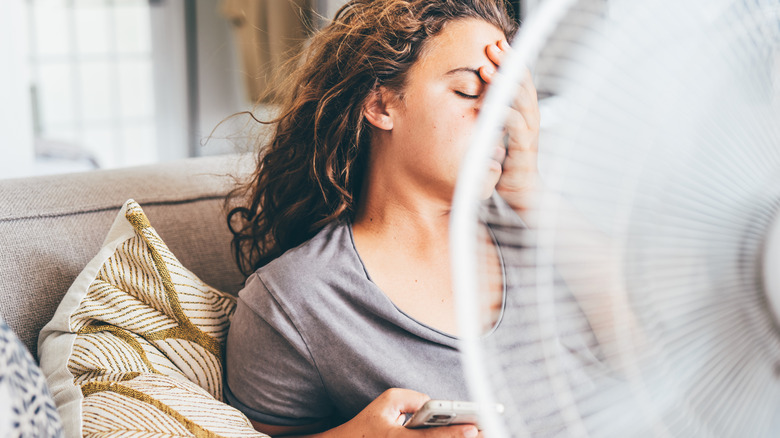The Ideal Thermostat Settings To Stay Cool During A Heat Wave
During the summer months, it's important to keep yourself protected from extreme heat. There's an ideal thermostat setting to stay cool during a heat wave, and it might be controversial. The ideal setting recommended by Energy Star, an initiative by the Environmental Protection Agency, is 78 degrees Fahrenheit. This is a way to keep cool while also saving money. It doesn't matter whether you have a smart thermostat or one of the best AC units on the market — setting your thermostat lower will not cool your home any faster. Rather, you'll just end up with expensive energy bills.
The U.S. Energy Department also recommends taking it a step further by raising the thermostat a whopping seven degrees when no one is home. It's a way to save a significant amount on energy costs and also keep your AC unit from being overworked. That means the thermostat should be set around 85 degrees when the house isn't occupied.
Why 78 degrees Fahrenheit? During a heat wave, your energy bill can soar if your AC is working overtime, doing its best to bring down your home to a temperature that just isn't realistic given the environment. Keeping your home at 78 degrees may not give you ice cold air, but it is a smart and efficient idea to cool down a room while keeping you and your family comfortable.
Smart cooling tips that go beyond your AC unit
Your AC unit isn't the only element available to you that can keep you cool during a heat wave. Believe it or not, a surprising amount of heat enters your home through completely preventable ways. From sunlight entering through uncovered windows to warm air sneaking in the house through tiny gaps in doors and vents, unbeknownst to you sources of heat are entering your home. That's why there are so many helpful tips for keeping your home protected in extreme heat.
One of the major factors in keeping your AC running efficiently is staying on top of maintenance. Whether it's getting your AC serviced by a professional or simply changing the filter and giving the coils a good clean, it's an important step to take that will help improve performance. And beyond the maintenance, running your ceiling fans counter clockwise to create a cooling breeze and closing curtains and blinds during the hottest parts throughout the day will help reduce heat from sunlight.
These might sound like simple things and you might be wondering whether they'll actually make a difference or not, but it's the little things that count. Not only will these simple actions take some load off of your hardworking AC, but they'll also add up to measurable savings on your energy bill over the course of time.

